Key takeaways:
- Interactivity is essential for online events, fostering real-time engagement that enhances audience connection.
- Technical preparation and tool selection, such as quality streaming software and visual graphics, significantly impact the event experience.
- Sharing personal stories during events can deepen relatability and create emotional connections with the audience.
- Effective time management and structured agendas are crucial for maintaining audience interest and satisfaction throughout the event.
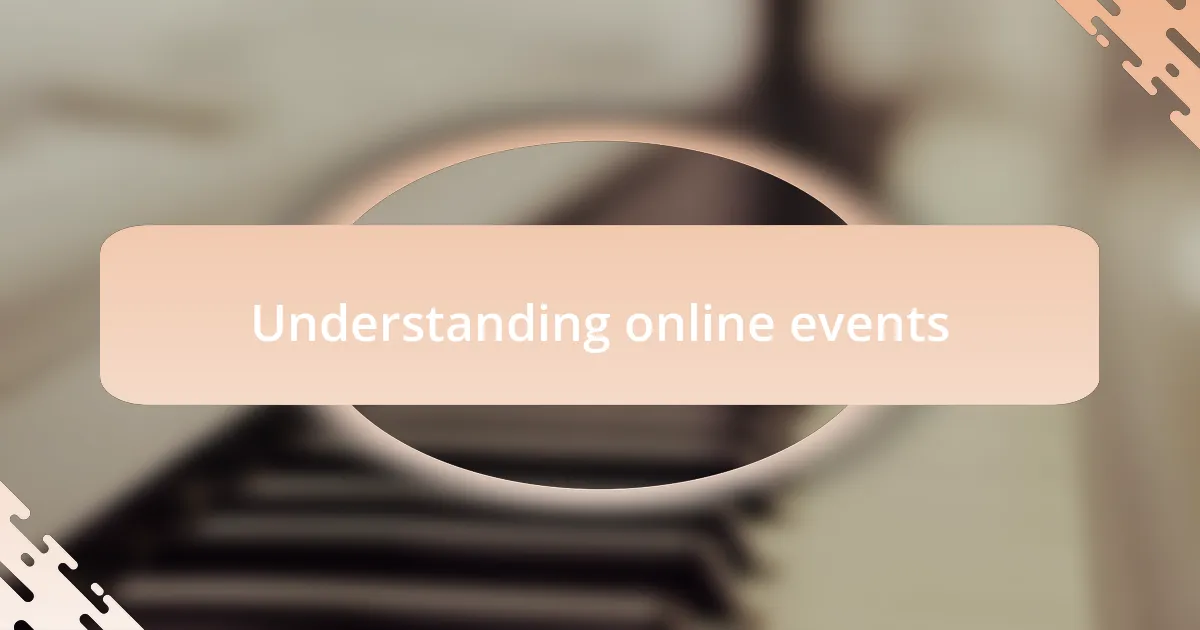
Understanding online events
Online events have transformed the way we connect with audiences, offering a platform that is both accessible and immediate. I remember hosting my first virtual concert, feeling a rush of excitement mixed with anxiety. How do you capture the essence of a live show through a screen? It became clear to me that interaction is key; real-time chat and audience engagement can create an electrifying atmosphere, even from miles apart.
Understanding the different formats of online events is crucial. Whether it’s a live stream, a webinar, or a virtual meet-and-greet, each format brings its unique challenges and rewards. I once experimented with a Q&A session after a performance, and the candid exchanges with the audience not only enhanced their experience but left me feeling more connected than any applause ever could.
I learned that preparation is just as vital online as it is offline. The technical aspects, like ensuring a stable internet connection and high-quality audio, can make or break an event. I recall one instance where an unexpected glitch disrupted a performance; it reminded me that, behind the screens, we’re all human, trying to create something memorable in an ever-evolving digital landscape.
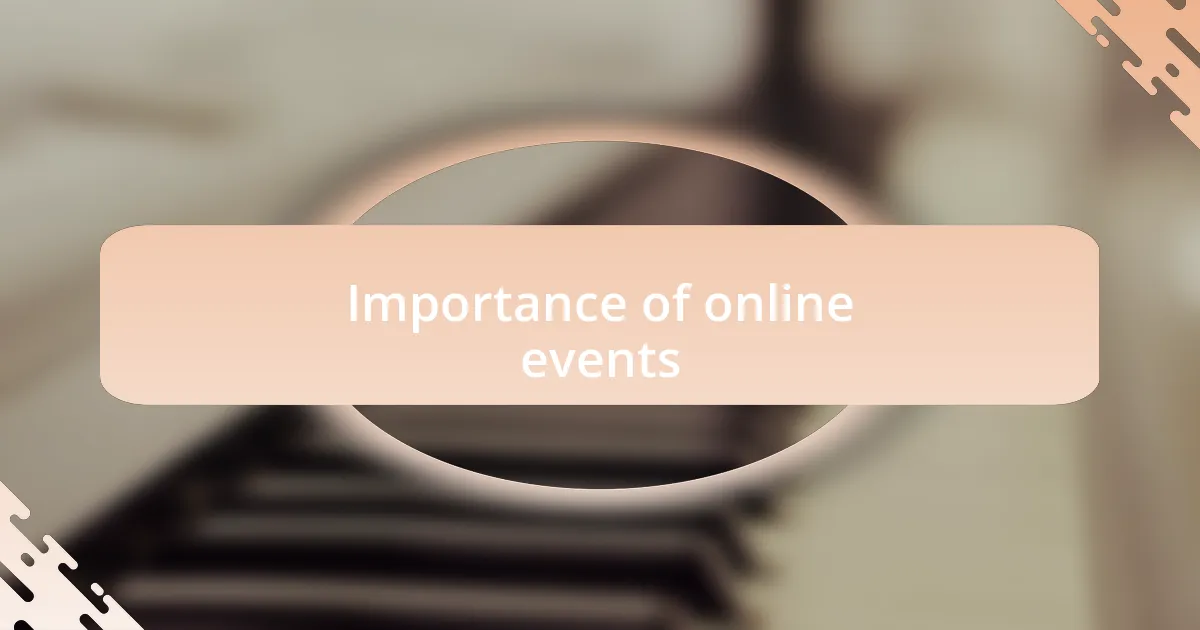
Importance of online events
Hosting online events has become essential for reaching and engaging audiences effectively. I vividly recall the thrill of seeing fans join from various parts of the world, each with unique backgrounds and stories. It made me realize how cutting-edge technology can dissolve geographical barriers; suddenly, a small venue in my hometown could host global participation.
The importance of online events extends beyond mere audience reach; they foster genuine connections. I once launched a series of interactive workshops that not only included performances but also encouraged participants to share their musical journeys. The heartfelt stories exchanged created a space of vulnerability, where everyone felt heard and valued. Have you ever thought about how online platforms can amplify voices that might go unnoticed?
Moreover, the flexibility of scheduling online events is groundbreaking. When I moved my music lessons online, I found it easier to accommodate diverse time zones, allowing students worldwide to participate. This adaptability was eye-opening for me; it’s not just about performing but about fostering an inclusive community that thrives on shared experiences and learning.
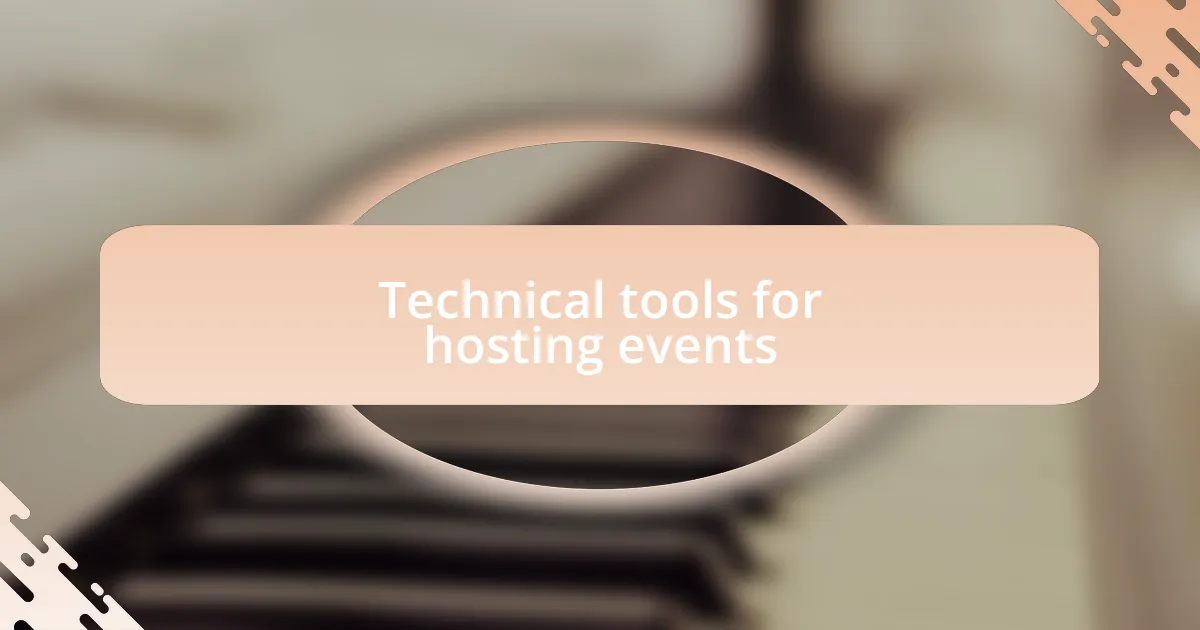
Technical tools for hosting events
When it comes to hosting online events, the right technical tools can make all the difference. For instance, I’ve experimented with various platforms like Zoom and YouTube Live, each catering to different needs. The first time I realized the impact of using a high-quality streaming software was during a virtual concert. The clarity of sound and image transformed the experience for both me and my audience, creating an immersive environment that felt almost like a live performance.
In my experience, engaging tools such as OBS Studio for live streaming or Canva for visually appealing graphics can elevate your event. I remember the excitement of setting up a backdrop that visually represented my band brand; it was a small touch, but it made the live session feel polished. Have you considered how tiny details, like quality visuals or interactive polls, can engage your audience?
Another game changer has been using chat engagement tools like Slido. They sparked a lively interaction during a particularly memorable Q&A session after an online seminar. Seeing questions pop up in real-time not only energized the audience but also gave me insights into what really resonated with them, creating a deeper connection. Wouldn’t it be amazing to leave your audience with a sense of participation instead of mere observation?
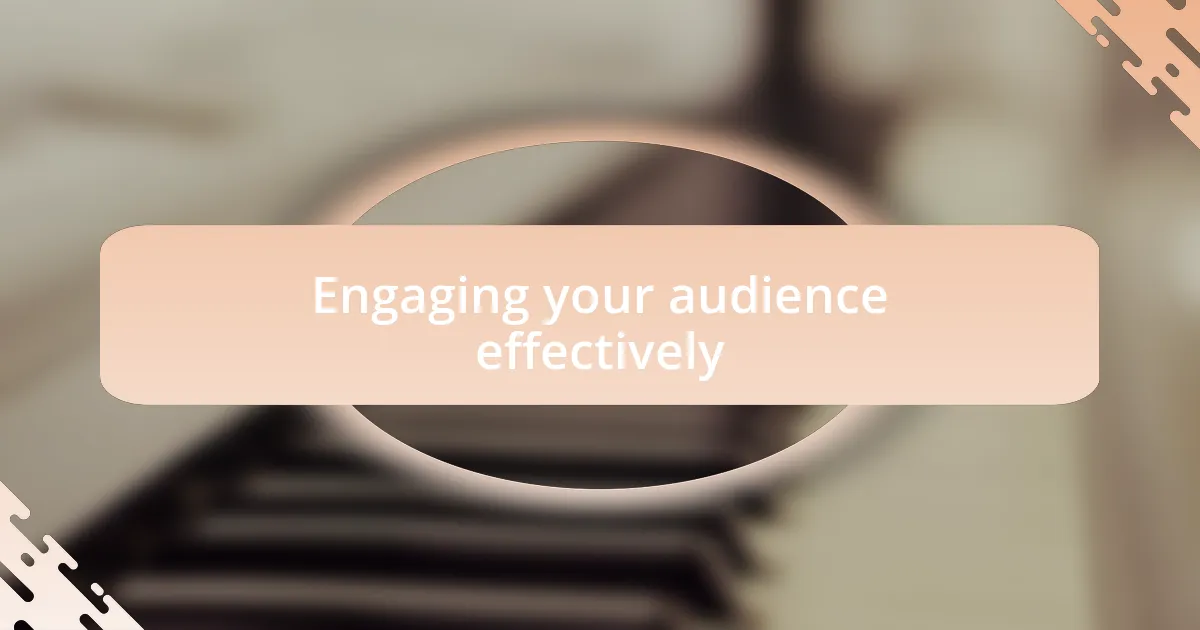
Engaging your audience effectively
Interactivity is key to keeping your audience engaged. I remember hosting an event where I invited attendees to share their thoughts and experiences through live polls. The response was overwhelming and it felt like we were all part of a lively conversation rather than a one-sided presentation. It’s incredible how simple tools can foster a sense of community among viewers.
Another memorable moment was when I incorporated a live chat feature during a workshop. Participants started sharing their own stories related to the topic, and I found myself responding in real time. Those personal exchanges not only made the session more dynamic but also deepened my connection with the audience. Have you thought about how fostering conversations can transform your listeners from passive observers into active participants?
An effective way to maintain engagement is through storytelling. There was a time during my event when I shared a personal anecdote related to the music industry, and the chat exploded with reactions. It’s fascinating how opening up about your journey can create layers of relatability. Isn’t it true that people connect more with emotions than facts alone? By weaving your narrative into the fabric of the event, you not only captivate your audience but also invite them to connect with you on a personal level.
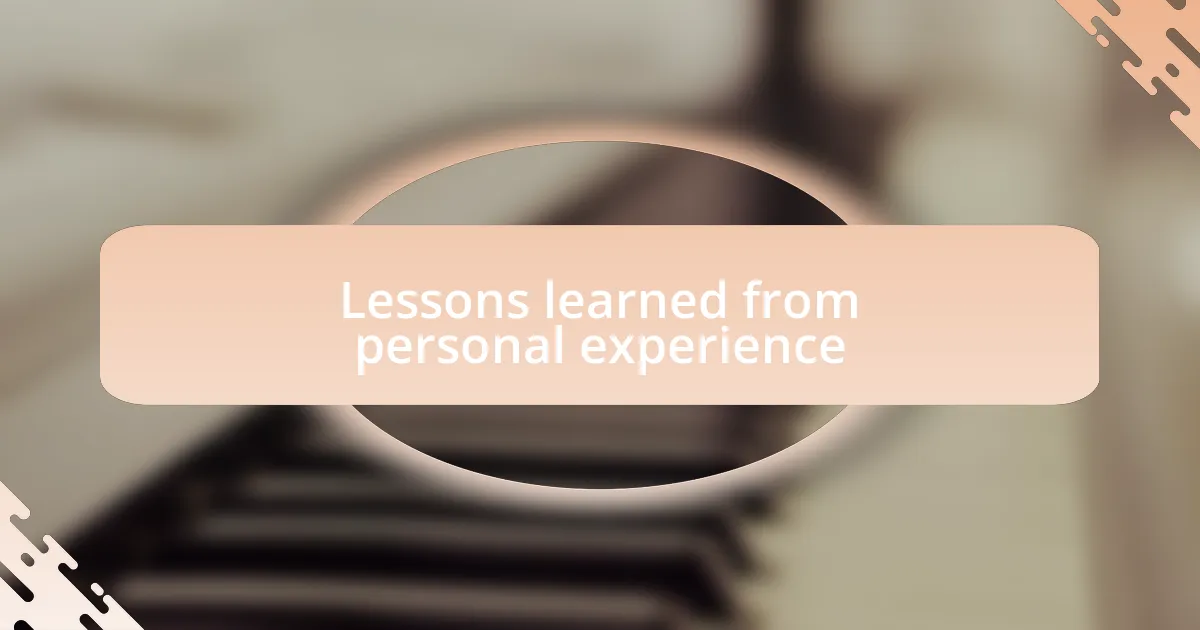
Lessons learned from personal experience
Hosting online events has taught me the importance of preparation. I recall one instance where I underestimated the need for technical checks before the event. As the start time approached, I struggled with sound issues. It was a stressful moment that underscored how crucial it is to test everything thoroughly in advance. Have you ever faced such a hurdle that made you rethink your approach? Those experiences are invaluable.
The feedback I received after my events has been an eye-opener. Once, a participant shared that they felt inspired to start their own music project after attending my workshop. That validation reminded me how powerful my role can be in influencing others. Isn’t it rewarding to know that your efforts can spark creativity and motivation in someone else? These moments keep me motivated to improve and refine my approach continuously.
Another lesson I learned revolves around time management. During one event, I lost track of time while answering questions, and it resulted in a rushed conclusion. The sense of urgency created an abrupt ending that left attendees wanting more. I realized that balancing interaction with a structured agenda is vital to ensure everyone walks away satisfied. Have you found that managing time effectively can enhance the overall experience? It’s a skill that, once mastered, can elevate your events to a new level.
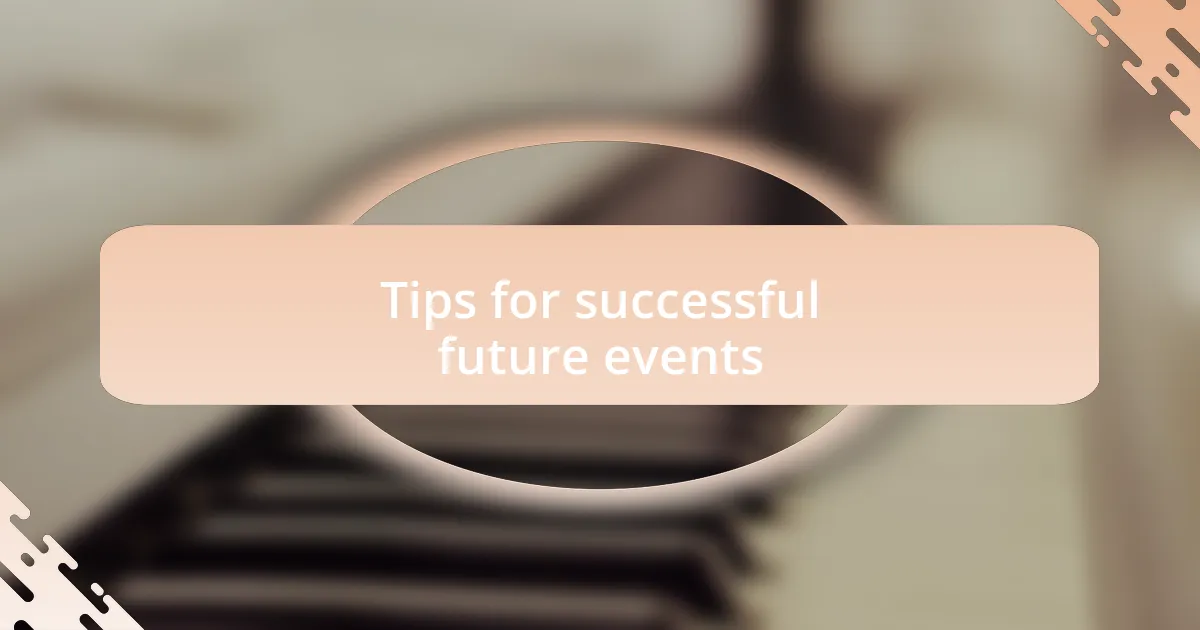
Tips for successful future events
One invaluable tip for successful future events is to create a detailed agenda and stick to it. I once found myself discussing a particularly passionate topic, completely losing track of time. While the conversation flowed beautifully, I noticed attendees becoming restless as they anticipated the next segment. This taught me that while passion is important, so is structure—it ensures that everyone gets the much-needed information while keeping the energy levels high. Have you ever been in a session where the speaker diverged too much? It can turn a great experience into an awkward one.
Engaging your audience is crucial. I recall a moment during a Q&A session when I turned the floor over to participants, and the energy shifted dramatically. Their excitement and enthusiasm flooded the chat, creating a dynamic atmosphere that encouraged more sharing. This experience reinforced my belief in the power of audience involvement. How often do you incorporate their input into your events? It can make all the difference, fostering a sense of community and belonging.
Lastly, don’t forget the importance of follow-up communication. After one event, I sent out a simple thank-you email along with a recap of the highlights, and I was amazed at the responses I received. People appreciated the personal touch and felt more connected. This encouraged them to engage in future events. How do you cultivate relationships after the event is over? Establishing a post-event connection can transform casual attendees into loyal participants over time.